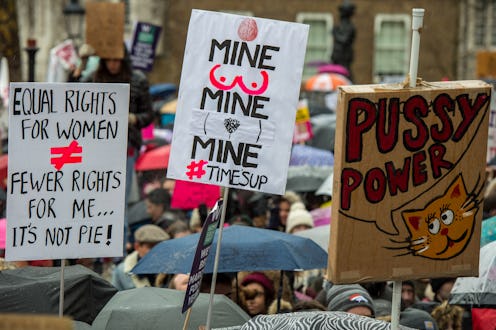Life
I've Been Harassed & Followed Home, So Yes, I Do Want Misogyny To Be A Hate Crime

There are certain things that keep me up at night; do the Spice Girls have a secret WhatsApp group planning their return to World domination? Has that top come back into stock on ASOS? Does the woman at the gym think I am pathetic for only going on the day that the payment comes out of my bank account? Aside from all of these queries something else has been on my mind as of late. Should misogyny be a hate crime?
I have to walk past a big construction site on my way to work. Last week, just over the top of Dua Lipa belting out "New Rules" through my ear phones, I hear “give us a smile love, it might never happen.” A couple of days later I am walking back from the pub. It isn’t late, maybe 11 p.m. In my peripheral vision I see a man about ten feet behind me. He follows me all the way to the end of my road at which point, keys clenched in my fist, I run inside my house. When I tell a friend the next day, he says I probably shouldn’t have been walking home alone.
On a packed train a week later, after being accosted by a stranger for 20 minutes because I wouldn’t give him my number he shouted “you shouldn’t play hard to get babe, you’re not pretty enough for that.” No one said anything. Are you shocked by any of this? No? I didn’t think so.
Women and girls up and down the UK and around the world will have similar, if not identical stories to this. Plan UK found that 66 percent of girls in the UK have experienced unwanted sexual attention or unwanted sexual or physical contact in a public place. Speaking to 1,004 girls aged 14-21, 1 in 10 had experienced upskirting. To avoid harassment in the street, 28 percent don’t go out at night, 22 percent take a longer route home so to avoid a certain place, and 17 percent dress differently. There is no surprise that if this is happening to girls as young as 14 then by the time they reach their twenties it is seen as normal behaviour, a prerequisite of being born with a vagina. Only, it isn’t.
This week Labour MP, Stella Creasy called for government to change legislation to make all forms of sexual harassment a hate crime. She wrote in Metro, “If someone targets people on the basis of their race or their religion they can receive a tougher sentence for their behaviour. Someone who repeatedly targets women faces no such sanction.”
I can hear it already, the public outcry that political correctness has gone mad. Catcalling and being told to smile is a depressingly common part of many women’s lives, but should it be illegal? Women are already protected against violence and abuse by the law. But if you are asking me whether I think laws treating misogynistic behaviour as a hate crime would be a move in the right direction, I do, and I don’t understand why it hasn’t be done earlier.
Sadly, misogyny isn’t going away by itself. Whilst we have the statistics reported by the Guardian that two women a week are killed by their partners and one third of women experience abuse, there's a sense they may be underestimating the problem, and abuse doesn’t happen in a vacuum. Research conducted by the Women and Equalities Committee found that more than 50 percent of girls have experienced sexual harassment in an educational environment and 71 percent said they hear terms such as "slut" and "slag" used regularly. Whilst this might seem like not a big deal, a joke, if police cannot monitor smaller offences as hate crime then the statistics for abuse against women are always going to be skewed.
In 2016, Nottinghamshire Police became the first force to record street harassment in the same way that they record other hate crimes, the Guardian reports. Misogyny hate crime is classed under the new policy as “incidents against women that are motivated by an attitude of a man towards a woman, and includes behaviour targeted towards a woman by men simply because they are a woman.”
Treating misogyny and street harassment in this way won’t only give us a more accurate perspective on how pervasive abuse is but it will also show women that they are being listened to and taken seriously. #MeToo highlighted that men and women are no longer prepared to accept the status quo. This isn’t about persecuting serial cat-callers. It is about telling the 15-year-old girl who gets harassed in the street in her school uniform that her fear and anger is valid. We will never truly understand the extent of violence against women until we are treated as equals. This isn’t small or insignificant.